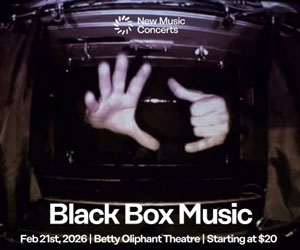By happy coincidence the past few months have seen new releases by many of Toronto’s most consistently creative musicians.
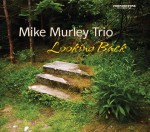 The trio of saxophonist Mike Murley, guitarist Ed Bickert and bassist Steve Wallace set a high standard for harmonically sophisticated, lyrical chamber jazz. The group released just two CDs – Live at the Senator and Test of Time – but each won the JUNO for Best Traditional Jazz Album, the former in 2002 and the latter in 2013. Guitarist Reg Schwager assumed the guitar chair when Bickert retired in 2001, but Looking Back (Cornerstone CRST CD143 cornerstonerecordsinc.com) is the first time this configuration of The Mike Murley Trio has recorded. The tunes are chosen with rare taste, emphasizing little-heard pieces by great composers, like Billy Strayhorn’s Isfahan and Antônio Carlos Jobim’s If You Never Come to Me. It’s music of supreme artistry, floated aloft on Murley’s distinctive, almost feathery, tenor saxophone sound and the bubbling electric clarity of Schwager’s guitar, all of it tethered joyously to Wallace’s pulsing bass lines. A rare blend of wistful reflections and soaring freedom make the CD another JUNO contender.
The trio of saxophonist Mike Murley, guitarist Ed Bickert and bassist Steve Wallace set a high standard for harmonically sophisticated, lyrical chamber jazz. The group released just two CDs – Live at the Senator and Test of Time – but each won the JUNO for Best Traditional Jazz Album, the former in 2002 and the latter in 2013. Guitarist Reg Schwager assumed the guitar chair when Bickert retired in 2001, but Looking Back (Cornerstone CRST CD143 cornerstonerecordsinc.com) is the first time this configuration of The Mike Murley Trio has recorded. The tunes are chosen with rare taste, emphasizing little-heard pieces by great composers, like Billy Strayhorn’s Isfahan and Antônio Carlos Jobim’s If You Never Come to Me. It’s music of supreme artistry, floated aloft on Murley’s distinctive, almost feathery, tenor saxophone sound and the bubbling electric clarity of Schwager’s guitar, all of it tethered joyously to Wallace’s pulsing bass lines. A rare blend of wistful reflections and soaring freedom make the CD another JUNO contender.
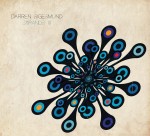 Reg Schwager turns up in another fine ensemble, trombonist Darren Sigesmund’s distinctive septet, on Strands III (darrensigesmund.ca). Sigesmund is an outstanding composer, creating welcoming moods comprised of evocative and elusive harmonies. His music is both warm and cool, dense and transparent, and there’s a subtle Latin flavour woven throughout. If his earlier work suggested a strong Wayne Shorter influence, his own identity is everywhere apparent here, its distinctive sound formed by the unusual combination of Eliana Cuevas’ wordless voice, his own mellifluous trombone and the expressive wail of Luis Deniz’s alto and soprano saxophones, complemented by Schwager, vibraphonist Michael Davidson, bassist Jim Vivian and drummer Ethan Ardelli. El Encanto, the only song here with words (Cuevas’ own) is particularly compelling.
Reg Schwager turns up in another fine ensemble, trombonist Darren Sigesmund’s distinctive septet, on Strands III (darrensigesmund.ca). Sigesmund is an outstanding composer, creating welcoming moods comprised of evocative and elusive harmonies. His music is both warm and cool, dense and transparent, and there’s a subtle Latin flavour woven throughout. If his earlier work suggested a strong Wayne Shorter influence, his own identity is everywhere apparent here, its distinctive sound formed by the unusual combination of Eliana Cuevas’ wordless voice, his own mellifluous trombone and the expressive wail of Luis Deniz’s alto and soprano saxophones, complemented by Schwager, vibraphonist Michael Davidson, bassist Jim Vivian and drummer Ethan Ardelli. El Encanto, the only song here with words (Cuevas’ own) is particularly compelling.
 Fern Lindzon is a rare jazz singer, her strong identity based on nuanced expression, a clear, almost silky voice, and a freedom from the collections of mannerisms that many jazz singers use to distinguish themselves. Instead, her work seems to grow from her solid piano playing and the empathy that exists with her band. For her third CD, Like a Circle in a Spiral (iatros IMO3 fernlindzon.com), she moves deftly between languages and styles, singing songs in Hebrew (Mishaela) and Yiddish (A Malekh Veynt) with the same idiomatic comfort that marks the more familiar Windmills of Your Mind. The most striking piece may be her arrangement of alternative pop songwriter Ron Sexsmith’s Jazz at the Bookstore, a richly ironic rendition in which accomplished jazz musicians (saxophonist David French, bassist/producer George Koller, vibraphonist Michael Davidson and drummer Nick Fraser) get to “play” jazz musicians.
Fern Lindzon is a rare jazz singer, her strong identity based on nuanced expression, a clear, almost silky voice, and a freedom from the collections of mannerisms that many jazz singers use to distinguish themselves. Instead, her work seems to grow from her solid piano playing and the empathy that exists with her band. For her third CD, Like a Circle in a Spiral (iatros IMO3 fernlindzon.com), she moves deftly between languages and styles, singing songs in Hebrew (Mishaela) and Yiddish (A Malekh Veynt) with the same idiomatic comfort that marks the more familiar Windmills of Your Mind. The most striking piece may be her arrangement of alternative pop songwriter Ron Sexsmith’s Jazz at the Bookstore, a richly ironic rendition in which accomplished jazz musicians (saxophonist David French, bassist/producer George Koller, vibraphonist Michael Davidson and drummer Nick Fraser) get to “play” jazz musicians.
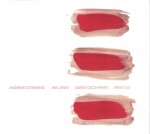 Bassist Andrew Downing, trumpeter Jim Lewis and guitarist David Occhipinti provide comparable surprise on Bristles (Occdav Music - OM007, davidocchipinti.com), as they alternate a series of brief collective improvisations with longer treatments of standards. Each of the improvisations is named for a 20th-century painter, with a direct methodological link between the repeated even tones and cyclical discords of Cy Twombly and the sudden swirling lines of Jackson Pollock. The standards are evidently chosen for melodic richness, with the trio exploring the possibilities of such tunes as My One and Only Love, Emily and I Fall in Love Too Easily. There’s a spectacular clarity of thought and sound as the three embellish and reshape their materials, at times turning suddenly from icy abstraction to the most exalted lyricism.
Bassist Andrew Downing, trumpeter Jim Lewis and guitarist David Occhipinti provide comparable surprise on Bristles (Occdav Music - OM007, davidocchipinti.com), as they alternate a series of brief collective improvisations with longer treatments of standards. Each of the improvisations is named for a 20th-century painter, with a direct methodological link between the repeated even tones and cyclical discords of Cy Twombly and the sudden swirling lines of Jackson Pollock. The standards are evidently chosen for melodic richness, with the trio exploring the possibilities of such tunes as My One and Only Love, Emily and I Fall in Love Too Easily. There’s a spectacular clarity of thought and sound as the three embellish and reshape their materials, at times turning suddenly from icy abstraction to the most exalted lyricism.
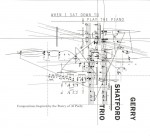 Pianist Gerry Shatford worked extensively in the Montreal, Vancouver and Ottawa jazz scenes before returning to Toronto where he was raised. He’s been emphasizing composition in recent years, along with studies with master pianist Stanley Cowell, and the results of both pursuits are documented on When I Sat Down to Play the Piano (gerryshatford.com), a suite of pieces inspired by Al Purdy’s poetry. Viewed through the great piano tradition of James P. Johnson, Thelonious Monk (his compositions get quoted) and Bud Powell, the poems find analogues in the off-kilter stride of Home-Made Beer or the romantic reverie of How a Dog Feels to Be Old. Accompanied here by the ideal rhythm section in bassist Neil Swainson and drummer Terry Clarke, the journeyman Shatford reveals a strong identity of his own.
Pianist Gerry Shatford worked extensively in the Montreal, Vancouver and Ottawa jazz scenes before returning to Toronto where he was raised. He’s been emphasizing composition in recent years, along with studies with master pianist Stanley Cowell, and the results of both pursuits are documented on When I Sat Down to Play the Piano (gerryshatford.com), a suite of pieces inspired by Al Purdy’s poetry. Viewed through the great piano tradition of James P. Johnson, Thelonious Monk (his compositions get quoted) and Bud Powell, the poems find analogues in the off-kilter stride of Home-Made Beer or the romantic reverie of How a Dog Feels to Be Old. Accompanied here by the ideal rhythm section in bassist Neil Swainson and drummer Terry Clarke, the journeyman Shatford reveals a strong identity of his own.
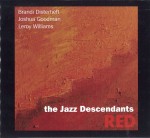 The Jazz Descendants are another piano trio featuring a relatively unknown pianist with a stellar rhythm section, combining bassist Brandi Disterheft and drummer Leroy Williams with pianist Joshua Goodman, who works regularly in Disterheft’s quartet. Red (Superfran Records SFR0008, superfranrecords.com) is dedicated to Barry Harris, the respected bop pianist and teacher with whom Williams has long been associated and with whom Goodman has studied. Much of the music is low key, Goodman blending his mainstream jazz and classical influences in a consistently pleasant way, While his reflective Medley goes on too long, stretching its pastoral themes to the 14-minute mark, he brings a precise bop touch to the venerable Scrapple from the Apple. The best moments come when Disterheft and Williams come to the fore, as on the bassist’s potent Prayer to Release the Troops.
The Jazz Descendants are another piano trio featuring a relatively unknown pianist with a stellar rhythm section, combining bassist Brandi Disterheft and drummer Leroy Williams with pianist Joshua Goodman, who works regularly in Disterheft’s quartet. Red (Superfran Records SFR0008, superfranrecords.com) is dedicated to Barry Harris, the respected bop pianist and teacher with whom Williams has long been associated and with whom Goodman has studied. Much of the music is low key, Goodman blending his mainstream jazz and classical influences in a consistently pleasant way, While his reflective Medley goes on too long, stretching its pastoral themes to the 14-minute mark, he brings a precise bop touch to the venerable Scrapple from the Apple. The best moments come when Disterheft and Williams come to the fore, as on the bassist’s potent Prayer to Release the Troops.



